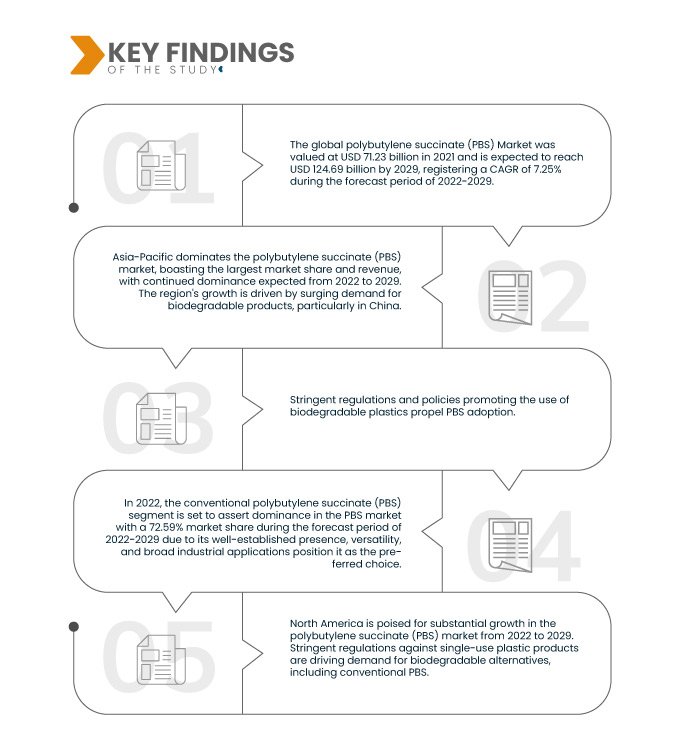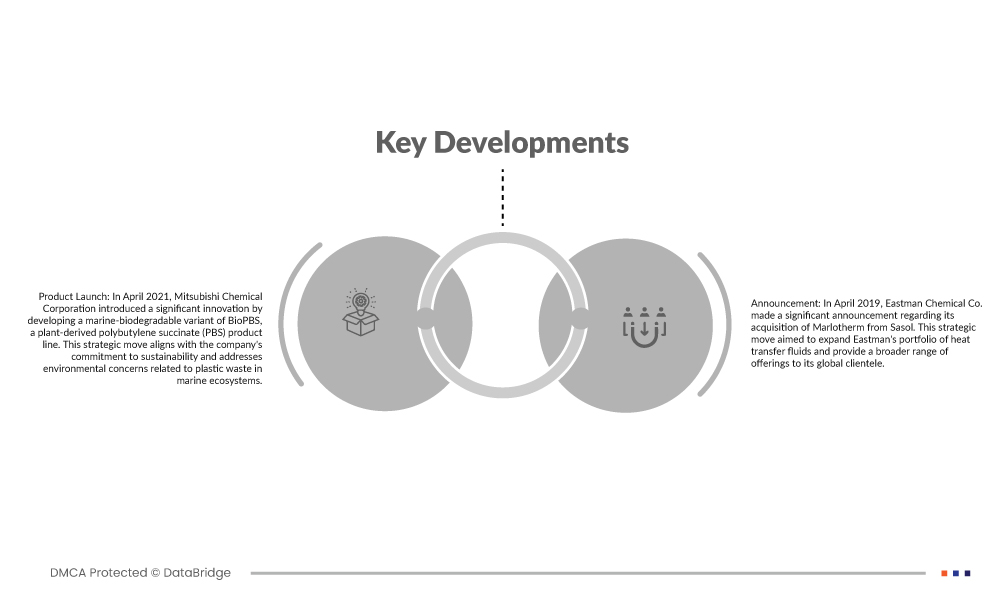폴리부틸렌 숙시네이트(PBS) 시장은 다양한 용도로 활용되며, 특히 생분해성 플라스틱 분야가 주요 시장입니다. PBS는 필름, 병, 용기 등 포장재에 널리 사용되어 기존 플라스틱에 대한 지속 가능한 대안을 제시합니다. 뛰어난 기계적 물성 덕분에 섬유 , 자동차 부품, 건축 자재 등에 적합합니다. 또한, 생체 적합성 덕분에 농업용 멀치 필름 및 의료 기기 에도 활용됩니다 . PBS의 다재다능함과 친환경적 특성은 PBS를 지속 가능한 소재 시장의 핵심 기업으로 자리매김하게 합니다.
전체 보고서는 https://www.databridgemarketresearch.com/reports/global-polybutylene-succinate-pbs-market 에서 확인하세요.
데이터 브리지 마켓 리서치(Data Bridge Market Research)에 따르면, 글로벌 폴리부틸렌 숙시네이트(PBS) 시장은 2021년 712억 3천만 달러 규모였으며, 2029년에는 1,246억 9천만 달러에 도달하여 2022년부터 2029년까지 연평균 7.25% 성장할 것으로 예상됩니다. 지속 가능한 포장재에 대한 수요 증가로 폴리부틸렌 숙시네이트(PBS) 사용량이 증가했습니다. 친환경적인 특성 덕분에 환경 발자국을 줄이는 동시에 소비자의 지속가능성 선호도에 부합하는 포장 솔루션을 제공하고자 하는 제조업체들에게 선호되는 소재입니다.
연구의 주요 결과
소비자 선호도가 시장 성장률을 견인할 것으로 예상
소비자들이 친환경적인 옵션을 선호함에 따라 제조업체들은 폴리부틸렌 숙시네이트(PBS)를 제품에 점점 더 많이 통합하고 있습니다. PBS의 생분해성과 환경 영향 감소는 지속 가능한 대안을 찾는 소비자들에게 공감을 얻고 있습니다. 이러한 변화는 환경적으로 책임 있는 소비를 지향하는 광범위한 추세를 반영하며, 기업들은 포장재부터 소비재에 이르기까지 모든 제품에서 PBS를 우선시하고 있습니다. PBS는 소비자의 가치에 부합하며, 기업이 지속가능성 목표를 달성하는 동시에 친환경 제품에 대한 증가하는 수요를 충족할 수 있도록 지원합니다.
보고서 범위 및 시장 세분화
보고서 메트릭
|
세부
|
예측 기간
|
2022년부터 2029년까지
|
기준 연도
|
2021
|
역사적인 해
|
2020 (2014-2019년으로 맞춤 설정 가능)
|
양적 단위
|
매출(10억 달러), 볼륨(단위), 가격(USD)
|
다루는 세그먼트
|
제품(기존 폴리부틸렌 숙시네이트(PBS), 바이오 기반 폴리부틸렌 숙시네이트(PBS)), 공정(트랜스 에스테르화, 직접 에스테르화), 응용 분야(가방, 멀치 필름, 포장 필름, 물에 녹는 위생 제품, 어망, 커피 캡슐, 목재 플라스틱 복합재, 기타), 용도(일회용, 재사용 가능), 포장층(1차 포장, 2차 포장, 3차 포장), 최종 용도(포장, 농업, 섬유, 소비재, 전기 및 전자, 자동차, 기타)
|
포함 국가
|
미국, 북미의 캐나다 및 멕시코, 독일, 프랑스, 영국, 네덜란드, 스위스, 벨기에, 러시아, 이탈리아, 스페인, 터키, 유럽의 기타 유럽 국가, 중국, 일본, 인도, 한국, 싱가포르, 말레이시아, 호주, 태국, 인도네시아, 필리핀, 아시아 태평양(APAC)의 기타 아시아 태평양(APAC), 사우디아라비아, UAE, 남아프리카 공화국, 이집트, 이스라엘, 중동 및 아프리카(MEA)의 일부인 기타 중동 및 아프리카(MEA), 남미의 일부인 기타 남미 국가.
|
시장 참여자 포함
|
Indorama Ventures Public Company Limited(태국), Alpek SAB de CV(멕시코), Jiangsu Sanfangxiang Group Co., Ltd.(중국), Far Eastern New Century Corporation(대만), DAK Americas(미국), BASF SE(독일), Zhejiang Biodegradable Advanced Material Co. Ltd(중국), Xinhaibio(중국), Lubrilog(프랑스), ECCO Gleittechnik GmbH(독일), HUSK-ITT Corporation(미국), Setral Chemie GmbH(독일), IKV Tribology Ltd(독일), Hangzhou Ruijiang Chemical Co.(중국) 및 WILLEAP(한국)
|
보고서에서 다루는 데이터 포인트
|
Data Bridge Market Research에서 큐레이팅한 시장 보고서에는 시장 가치, 성장률, 세분화, 지리적 범위, 주요 기업 등 시장 시나리오에 대한 통찰력 외에도 심층적인 전문가 분석, 지리적으로 대표되는 회사별 생산 및 용량, 유통업체 및 파트너의 네트워크 레이아웃, 자세하고 업데이트된 가격 추세 분석, 공급망 및 수요에 대한 부족 분석이 포함됩니다.
|
세그먼트 분석:
글로벌 폴리부틸렌 숙시네이트(PBS) 시장은 제품, 공정, 응용 분야, 용도, 포장층 및 최종 용도를 기준으로 세분화됩니다.
- 제품 기준으로 글로벌 폴리부틸렌 숙시네이트(PBS) 시장은 기존 폴리부틸렌 숙시네이트(PBS)와 바이오 기반 폴리부틸렌 숙시네이트(PBS) 로 구분됩니다 . 2022년에는 기존 폴리부틸렌 숙시네이트(PBS) 부문이 2022년부터 2029년까지의 예측 기간 동안 72.59%의 시장 점유율을 기록하며 PBS 시장에서 우위를 점할 것으로 예상됩니다. 탄탄한 입지, 다재다능함, 그리고 광범위한 산업 응용 분야를 갖춘 PBS는 업계 최고의 선택으로 자리매김했습니다.
2022년에는 제품 부문의 기존 폴리부틸렌 숙시네이트(PBS) 부문이 글로벌 폴리부틸렌 숙시네이트(PBS) 시장을 지배할 것으로 예상됩니다.
2022년에는 기존 폴리부틸렌 숙시네이트(PBS) 부문이 2022년부터 2029년까지의 예측 기간 동안 72.59%의 시장 점유율을 기록하며 PBS 시장에서 우위를 점할 것으로 예상됩니다. PBS는 탄탄한 입지, 다재다능함, 그리고 광범위한 산업 응용 분야를 갖추고 있어 선호되는 선택지로 자리매김하고 있습니다. 지속가능성에 대한 관심이 높아짐에 따라, 검증된 실적을 바탕으로 기존 PBS는 친환경 및 생분해성 플라스틱에 대한 증가하는 수요를 충족하는 유력한 경쟁자로 부상하고 있습니다.
- 전 세계 폴리부틸렌 숙시네이트(PBS) 시장은 공정 기준으로 트랜스에스테르화와 직접 에스테르화로 구분됩니다 . 2022년에는 트랜스에스테르화 부문이 2022년부터 2029년까지의 예측 기간 동안 66.61%의 시장 점유율을 기록하며 폴리부틸렌 숙시네이트(PBS) 시장을 주도할 것으로 예상됩니다. 이 공정은 PBS 생산에 중추적인 역할을 하며, 재료 특성 및 품질에 대한 향상된 제어를 제공합니다.
2022년에는 공정 부문 의 트랜스에스테르화 부문이 글로벌 폴리부틸렌 석시네이트(PBS) 시장을 지배할 것으로 예상됩니다.
2022년에는 트랜스에스테르화 공정이 폴리부틸렌 숙시네이트(PBS) 시장에서 66.61%의 시장 점유율을 기록하며 선두를 차지할 것으로 예상됩니다. 2022년부터 2029년까지의 예측 기간 동안 이 공정은 PBS 생산에 중추적인 역할을 하며, 소재 특성과 품질에 대한 향상된 제어를 제공합니다. 다재다능하고 효율적인 이 공정은 제조업체들이 선호하는 선택으로, 지속 가능하고 생분해성 플라스틱에 대한 증가하는 수요를 충족하는 데 있어 우위를 점하고 있습니다.
- 글로벌 폴리부틸렌 숙시네이트(PBS) 시장은 용도별 로 비닐 봉지, 멀치 필름, 포장 필름, 플러시형 위생용품, 어망, 커피 캡슐, 목재 플라스틱 복합재 등 으로 구분됩니다 . 2022년에는 멀치 필름 부문이 2022년부터 2029년까지의 예측 기간 동안 26.96%의 시장 점유율을 기록하며 폴리부틸렌 숙시네이트(PBS) 시장을 주도할 것으로 예상됩니다. PBS의 생분해성 특성은 친환경 멀치 필름 생산, 지속 가능한 농업 관행에 기여, 그리고 이 분야에서 생분해성 소재에 대한 수요 충족에 이상적인 선택입니다.
- 전 세계 폴리부틸렌 숙시네이트(PBS) 시장은 용도별 로 일회용 과 재사용 가능 제품 으로 구분됩니다 . 2022년에는 재사용 가능 부문이 2022년부터 2029년까지의 예측 기간 동안 71.99%의 시장 점유율을 기록하며 폴리부틸렌 숙시네이트(PBS) 시장을 주도할 것으로 예상됩니다. PBS는 내구성과 생분해성이 뛰어나 친환경 용기, 섬유, 소비재 등 지속가능성 목표에 부합하는 재사용 가능 제품을 제조하는 데 적합한 소재입니다.
- 포장층을 기준으로 전 세계 폴리부틸렌 숙시네이트(PBS) 시장은 1차 포장, 2차 포장, 3차 포장 으로 구분됩니다 . 2022년에는 1차 포장이 2022년부터 2029년까지의 예측 기간 동안 47.11%의 시장 점유율을 기록하며 폴리부틸렌 숙시네이트(PBS) 시장을 주도할 것으로 예상됩니다. PBS는 생분해성과 지속 가능한 1차 포장재 제작에 적합하여 친환경적이고 책임감 있는 포장 솔루션에 대한 수요 증가에 부응하며, 이 분야에서 선도적인 입지를 확보하고 있습니다.
- 최종 용도 기준으로 전 세계 폴리부틸렌 숙시네이트(PBS) 시장은 포장, 농업, 섬유, 소비재, 전기 및 전자, 자동차 등 으로 세분화됩니다 . 2022년에는 포장 부문이 2022년부터 2029년까지의 예측 기간 동안 28.28%의 시장 점유율을 기록하며 폴리부틸렌 숙시네이트(PBS) 시장을 선도할 것으로 예상됩니다. PBS의 생분해성, 기계적 강도, 그리고 친환경 포장 솔루션에 대한 적합성은 지속 가능한 포장재에 대한 수요 증가에 부합하며, 이러한 분야에서 PBS가 탁월한 선택이 될 것입니다.
주요 플레이어
Data Bridge Market Research에서는 글로벌 폴리부틸렌 숙시네이트(PBS) 시장의 주요 기업으로 Indorama Ventures Public Company Limited(태국), Alpek SAB de CV(멕시코), Jiangsu Sanfangxiang Group Co., Ltd.(중국), Far Eastern New Century Corporation(대만), DAK Americas(미국), BASF SE(독일), Zhejiang Biodegradable Advanced Material Co. Ltd(중국)를 꼽았습니다.
시장 동향
- 2021년 4월, 미쓰비시 케미컬(Mitsubishi Chemical Corporation)은 식물성 폴리부틸렌 숙시네이트(PBS) 제품군인 BioPBS의 해양 생분해성 변형 제품을 개발하여 획기적인 혁신을 이루었습니다. 이러한 전략적 움직임은 지속가능성에 대한 미쓰비시의 의지와 일치하며, 해양 생태계의 플라스틱 폐기물과 관련된 환경 문제를 해결합니다. 이 해양 생분해성 BioPBS의 출시는 제품 포트폴리오를 강화할 뿐만 아니라, 성장하는 친환경 소재 시장에서 기회를 포착하고 잠재적으로 매출을 증대시킬 수 있는 입지를 확보하는 데에도 기여합니다.
- 2019년 4월, Eastman Chemical Co.는 Sasol로부터 Marlotherm 인수와 관련하여 중요한 발표를 했습니다. 이 전략적 조치는 Eastman의 열전달 유체 포트폴리오를 확장하고 전 세계 고객에게 더욱 광범위한 제품을 제공하기 위한 것이었습니다. Eastman은 Marlotherm을 자사 제품 라인에 통합함으로써 열전달 유체에 의존하는 다양한 산업 분야에서 역량을 강화하고, 이 분야의 선도적인 공급업체로서의 입지를 강화하고자 했습니다.
지역 분석
지리적으로, 글로벌 폴리부틸렌 숙시네이트(PBS) 시장 보고서에서 다루는 국가는 북미의 미국, 캐나다 및 멕시코, 유럽의 독일, 프랑스, 영국, 네덜란드, 스위스, 벨기에, 러시아, 이탈리아, 스페인, 터키, 유럽의 기타 유럽, 중국, 일본, 인도, 한국, 싱가포르, 말레이시아, 호주, 태국, 인도네시아, 필리핀, 아시아 태평양(APAC)의 기타 아시아 태평양(APAC), 사우디 아라비아, UAE, 남아프리카 공화국, 이집트, 이스라엘, 중동 및 아프리카(MEA)의 일부인 기타 중동 및 아프리카(MEA), 남미의 일부인 기타 남미입니다.
Data Bridge Market Research 분석에 따르면:
아시아 태평양 지역은 2022년부터 2029년까지의 예측 기간 동안 글로벌 폴리부틸렌 숙시네이트(PBS) 시장 에서 지배적인 지역입니다.
아시아 태평양 지역은 폴리부틸렌 숙시네이트(PBS) 시장을 장악하고 있으며, 가장 큰 시장 점유율과 매출을 기록하고 있습니다. 2022년부터 2029년까지 이러한 우위는 지속될 것으로 예상됩니다. 이 지역의 성장은 특히 중국에서 생분해성 제품에 대한 수요 급증에 힘입어 촉진되고 있습니다. 중국의 자동차 내장재 산업은 친환경 자동차 내장재 제조를 위한 PBS 수요 증가에 크게 기여하고 있습니다. 이러한 성장은 아시아 태평양 지역이 글로벌 PBS 시장에서 중추적인 역할을 수행하고 있음을 보여줍니다.
북미는 2022년부터 2029년까지의 예측 기간 동안 글로벌 폴리부틸렌 숙시네이트(PBS) 시장을 지배할 것으로 예상됩니다.
북미 지역은 2022년부터 2029년까지 폴리부틸렌 숙시네이트(PBS) 시장의 상당한 성장이 예상됩니다. 일회용 플라스틱 제품에 대한 엄격한 규제는 기존 PBS를 포함한 생분해성 대체재에 대한 수요를 견인하고 있습니다. 북미 지역의 지속가능성 강조는 재사용 가능 제품에서 PBS 사용량 증가와 맞물려 있습니다. 규제 준수와 친환경 솔루션에 대한 이러한 두 가지 강조는 북미 지역을 글로벌 PBS 시장의 핵심 성장 지역으로 자리매김하게 합니다.
글로벌 폴리부틸렌 숙시네이트(PBS) 시장 보고서에 대한 자세한 내용은 여기를 클릭하세요. – https://www.databridgemarketresearch.com/reports/global-polybutylene-succinate-pbs-market












